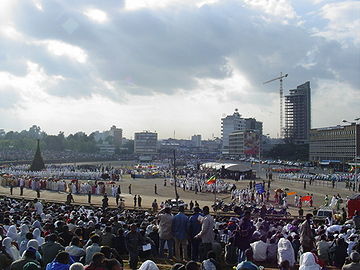- Meskel Square
-
Meskel Square (often transliterated as Meskal or Mesqel) is a square in the city of Addis Ababa, Ethiopia. It is often a site for public gathering or for demonstrations and festivals, notably, the Meskel Festival from which it takes its name.
The Meskel Festival has been celebrated for over 1,600 years.[1] The word "Meskel" means "cross" and the festival commemorates the moment when the crucifix was revealed to Empress Helena of Constantinople, mother of Constantine the Great.[1]
The festival is also seen as a moment to welcome in the spring season by displaying the distinctive yellow Meskel daisies.[1]
Thousands gather at the Square annually on 17 Meskerem in the Ethiopian calendar (September 27 in the Gregorian calendar), with celebrations in Addis Ababa beginning in the early afternoon when a procession bearing flaming torches approaches Meskel Square from various directions. A burning pyramid (demera) is located in the center and is circled by priests in brightly colored cloaks, students, brass bands, and the army carrying around giant crosses and torches.[1] They set the pyramid alight with their torches, and the burning pyramid is kept ablaze until dawn until the celebrations through the night have ended.[1]
History of the Square
Traditionally, the Meskel bonfire in Addis Ababa was lit by the Emperor of Ethiopia accompanied by members of the Imperial family, the nobility and high officials of the Orthodox Church and the government. The bonfire was initially lit in the square near the southern gate of St George's Cathedral during the reigns of Emperor Menelik II and Empress Zewditu, but was moved to its present location in the specifically constructed Meskel Square by Emperor Haile Selassie.
Following the fall of the monarchy in 1974, Meskel Square was renamed "Abiot" or Revolution Square. It was greatly expanded so that it could accommodate the annual Revolution Day and May Day parades on September 12 and May 1. Three gigantic portraits of Karl Marx, Friedrich Engels and Vladimir Lenin were erected in the square. The population of Addis Ababa would joke that these were the "new trinity".[citation needed] Meskel bonfires continued to be lit there however for a number of years, with the Patriarch of the Ethiopian Orthodox Tewahedo Church lighting the bonfire in place of the Emperor. Between 1988 and 1991, the officially atheist government ordered the Meskel celebration to be moved back to the small square outside the southern gates of St. George Cathedral. After the fall of Mengistu Haile Mariam, the short lived government of General Tesfaye Gebre Kidan restored the original name of Meskel Square, and the Ethiopian People's Revolutionary Democratic Front government returned the Meskel celebration to the square.
The square is often used for other secular purposes. Concerts, parades, and various other government and public events are held there. Political parties often hold rallies in the square. Part of the public ceremonies surrounding the re-burial of Emperor Haile Selassie took place in the square as well. The annual "Great Ethiopian Run" passes through Meskel Square. The national monument in memory of those massacred by the Derg regime in the "Red Terror" of the 1970s has been built at the eastern entrance to the square, and the remains of many victims from that period have been buried there : the Red Terror Martyrs Memorial Museum has been inaugurated in February 2010.
References
- ^ a b c d e "Religious Festivals:Meskal". Ethiopian Rift Valley Safaris. http://www.ethiopianriftvalleysafaris.com/meskal.htm. Retrieved November 1, 2008.
Categories:- Buildings and structures in Addis Ababa
- Town squares
- National squares
Wikimedia Foundation. 2010.

